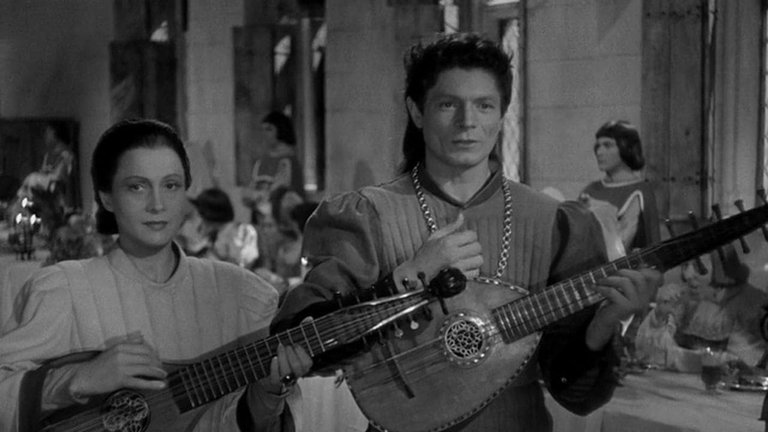Film Review: Les Visiteurs du soir (The Devil's Envoys, 1942)

Fall of France in the first year of Second World War didn’t mean the end for French cinema. Both authorities in Vichy’s puppet regime and German occupation zone were keen on keeping population content by providing cinema entertainment, and US entry into war on the side of Allies has temporarily deprived French film makers of their Hollywood competition. Despite serious war-related deprivation, French cinema continued to make films, some of which would become popular and later appreciated by film critics and historians. The best known of them all is Les Visiteurs du soir (“Evening Visitors”), 1942 period fantasy drama directed by Marcel Carné, also known by its later international title The Devil’s Envoys.
The plot is set somewhere in France in May 1485. The Devil has sent two of its envoys to make people miserable. They are Gilles (played by Alain Cuny) and his androgynous female companion Dominique (played by Arletty) who, posing as troubadours, come to the castle owned by Baron Hugues (played by Fernand Ledoux). Baron, a widower, has his beautiful daughter Anne (played by Marie Déa) engaged to Baron Renaud (played by Marcel Herrand) and he is celebrating by setting up days long feast and bringing any entertainer he could find. Gilles and Dominique fit the bill and use their guise to start working on their mission. Dominique switches to undoubtedly female look and manages to seduce both Hugues and Renaud, causing increasingly bitter rivalry between the two. Gilles is supposed to seduce Anne and he does it, but, in the process, he himself falls genuinely in love. This is seen as act of defiance by his master, who comes to the castle in the form of dark-clad wandering noble (played by Jules Berry) to take matters in hand personally.
Script for Les Visiteurs du soir was written by Pierre Laroche and Jacques Prevert, the latter being known as Carné’s collaborators and founder of Poetic Realism, 1930s French cinema movement that gave some of Carné’s most popular films like Port of Shadows. With its medieval setting and fantasy characters, this film looked completely opposite of Carné’s pre-war work. This wasn’t an accident. Carné deliberately chose distant historic period for in order to provide some sort of escape to his audience and, what was even more important, has less to worry about Vichy regime censors. This, on the other hand, meant that the film required extra effort with costumes, props and sets, including reconstruction of medieval castle that was based on 15th Century manuscript illumination Très Riches Heurs du Duc de Berry. The result is nevertheless very impressive, even more so in light of the fact that Carné had to deal not only with large logistical challenges, but also wartime deprivation, often having to hide rationed food from some 2000 of usually very hungry extras.
Les Visiteurs du soir, like previous Carné’s films, features very good cast. Arletty, one of the greatest stars of 1930s and 1940s, plays very interesting character that is both some sort of vampish femme fatale yet more enigmatic figure, that is both ambiguous in terms of gender identity and her moral alignment. Alain Cuny, on the other hand, is less impressive as devil’s envoy who becomes more of a conventional romantic protagonist and same thing, to a degree, can be said of Marie Déa who, on the other hand, makes the film’s melodramatic content easier to accept due to her more natural and down-to-earth sort sort of beauty. Yet, the efforts of those actors are often compromised with dialogue that at times sound too theatrical and uneven script that seems overlong. It takes almost an hour before things become interesting and mostly thanks to the arrival of the Devil, played brilliantly by Jules Berry, actor who had played psychopathic Valentin in Daybreak, Carné’s previous film. Duval’s performance was strong, so intimidating and so entertaining that many critics and film scholar after the war so his character as an allegory for Adolf Hitler and, consequently, entire film as Carné’s comment on the sorry state of affairs in his country under Nazi yoke. Carné, however, denied any political context of his work. Whatever the truth may be, audience in occupied France widely accepted the film making into most popular French film during Occupation. Its success allowed Carné to launch another project that would be finished after the war under title Children of Paradise and later enter history books his greatest work.
RATING: 6/10 (++)
Blog in Croatian https://draxblog.com
Blog in English https://draxreview.wordpress.com/
Leofinance blog https://leofinance.io/@drax.leo
Unstoppable Domains: https://unstoppabledomains.com/?ref=3fc23fc42c1b417
Hiveonboard: https://hiveonboard.com?ref=drax y
Bitcoin Lightning HIVE donations: https://v4v.app/v1/lnurlp/qrcode/drax
Rising Star game: https://www.risingstargame.com?referrer=drax
1Inch: https://1inch.exchange/#/r/0x83823d8CCB74F828148258BB4457642124b1328e
BTC donations: 1EWxiMiP6iiG9rger3NuUSd6HByaxQWafG
ETH donations: 0xB305F144323b99e6f8b1d66f5D7DE78B498C32A7
Posted using CineTV